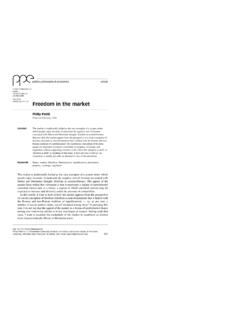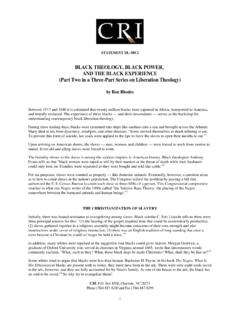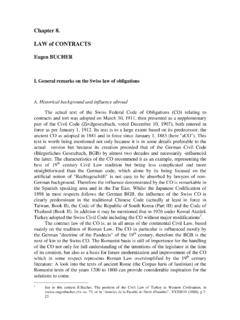Transcription of Excerpt from Chapter Eight Exit, Voice and Loyalty
1 The Social ContractSummer 1994272 Professor Hirschman wrote this book while in residence at the Center for Advanced Studiesin the Behavioral Sciences at Stanford University. Reprinted by permission of the publishersfrom exit , Voice , and Loyalty : Responses to Decline in Firms, Organizations, and States byAlbert O. Hirschman, Cambridge, Mass.: Harvard University Press, 1970 by the Presidentand Fellows of Harvard from Chapter EightExit, Voice and Loyalty :Responses to Decline in Firms, Organizations and StatesBy Albert O. Hirschman[Editor's Note: The author argues that there are twotypes of response to unsatisfactory situations in one'sfirm, organization or country. The first is " exit " orleaving without trying to fix things. The second is" Voice ," that is, speaking up and trying to remedy thedefects. Loyalty can modify the response, causing oneto stand and fight ( Voice ) rather than cut and run( exit ).]
2 The Chapter excerpted here deals in forcefullanguage with these choices in decisions about humanmigration.]It does not take much of a plunge, at this point, totake up as our last topic a special though sizable case that of exit and Voice in relation to Americanideology, tradition and principal point and puzzlement is easilystated: exit has been accorded an extraordinarilyprivileged position in the American tradition, but then,suddenly, it is wholly proscribed, sometimes for better,sometimes for worse, from a few key United States owes its very existence andgrowth to millions of decisions favoring exit overvoice. This "ultimate nature of the Americanexperience" has been eloquently described by LouisHartz:The men in the seventeenth century who fled toAmerica from Europe were keenly aware of theoppressions of European life.
3 But they wererevolutionaries with a difference, and the factof their fleeing is no minor fact: for it is onething to stay at home and fight the "canon andfeudal law," and it is another to leave it farbehind. It is one thing to try to establishliberalism in the Old World, and it is another toestablish it in the New. Revolution, to borrowthe words of Eliot, means to murder andcreate, but the American experience has beenprojected strangely in the realm of creationalone. The destruction of forests and Indiantribes heroic, bloody, legendary as it was cannot be compared with the destruction of asocial order to which one belongs oneself. Thefirst experience is wholly external and, beingexternal can actually be completed; the secondexperience is an inner struggle as well as anouter struggle, like the slaying of a Freudianfather, and goes on in a sense preference for the neatness of exit over themessiness and heartbreak of Voice has then "persistedthroughout our national history.
4 "2 The exit fromEurope could be re-enacted within the United Statesby the progressive settlement of the frontier, whichFrederick Jackson Turner characterized as the `gate ofescape from the bondage of the past.'3 Even though theopportunity to "go West" may have been more myththan reality for large population groups in the easternsection of the country,4 the myth itself was of thegreatest importance for it provided everyone with aparadigm of problem-solving. Even after the closing ofthe frontier, the very vastness of the country combinedwith easy transportation make it far more possible forAmericans than for most other people to think aboutsolving their problems through "physical flight" thaneither through resignation or through ameliorating andfighting in situ the particular conditions into whichone has been "thrown.
5 " The curious conformism ofAmericans, noted by observers ever since Tocqueville,may also be explained in this fashion. Why raise yourvoice in contradiction and get yourself into trouble aslong as you can always remove yourself entirely fromany given environment should it become toounpleasant?It will be noted that all these "flights" are in thenature of true exits, that is, exits from private ratherthan public goods: whatever effect they had on thesociety that was left behind was an unintended sideeffect. Those who departed from their communitieshad no thought of improving them thereby or offighting against them from the outside; they wereimmigrants rather than migr s, and soon after theirmove "couldn't care less" about the fate of thecommunities whence they came. In this perspective,the present-day "cop-out" movement of groups like thehippies is very much in the American tradition; onceagain dissatisfaction with the surrounding social orderleads to flight rather than fight, to withdrawal of thedissatisfied group and to its setting up a separateThe Social ContractSummer 1994273"scene.
6 " Perhaps, the reason for which these groupsare felt to be "un-American" is not at all their act ofwithdrawal, but, on the contrary, their demonstrative"otherness" which is sensed as an attempt to influencethe square society they are rejecting. By making theirexit so spectacular, by oddly combining deviance anddefiance, they are actually closer to Voice than was thecase for their pilgrim, immigrant, and pioneerforebears.".. Voice was fatally weakened byexit of the most quality-consciouscustomers of a firm or of themost valuable membersof an organization."The traditional American idea of successconfirms the hold which exit has had on the nationalimagination. Success or, what amounts to the samething, upward social mobility has long beenconceived of in terms of evolutionary successful individual who starts out at a low rungof the social ladder necessarily leaves his own groupbehind as he rises; he "passes" into, or is "accepted"by, the next higher group.
7 He takes his immediatefamily along, but hardly anyone else. Success is in factsymbolized and consecrated by a succession ofphysical moves out of the poor quarters in which hewas brought up into ever better neighborhoods. Hemay later finance some charitable activities designedto succor the poor or the deserving of the group andneighborhood to which he once belonged. But if anentire ethnic or religious minority group acquires ahigher social status, this occurs essentially as thecumulative result of numerous, individual,uncoordinated success stories and physical moves ofthis kind rather than because of concerted novelty of the black power movement on theAmerican scene consists in the rejection of thistraditional pattern of upward social mobility asunworkable and undesirable for the most depressedgroup in our society.
8 Significantly, it combines scornfor individual penetration into white society of a fewselected blacks with a strong commitment to"collective stimulation" of blacks as a group, and tothe improvement of the black ghetto as a place to the words of one spokesman:Integration, particularly in the token way inwhich it has been practiced up to now ..elevates individual members of a group, butparadoxically, in plucking many of the mostpromising members from a group while failingto alter the lot of the group as a whole,weakens the collective thrust which the groupmight otherwise formulation is strikingly similar to thepreviously mentioned situation railroads in Nigeria,public schools, and so forth in which exit wasineffective while Voice was fatally weakened by exitof the most quality-conscious customers of a firm or ofthe most valuable members of an the case of a minority that has beendiscriminated against a further argument can often bemade: namely, that exit is bound to be unsatisfactoryand unsuccessful even from the point of view of theindividuals who practice it.
9 The point is familiar, butit may be of interest to see it made not for "passing"Jews or Negroes in the United States, but for AndeanIndians:A normal pattern of change in the Andes is forthe individual to become a mestizo by leavinghis highland community of birth, rejecting hisIndian background, and assuming all possiblemestizo status symbols. The individual whobecomes a mestizo by this route, however, findshimself part of a despised "cholo" minority in aworld dominated by urban upper classes towhich he cannot unsatisfactory process of individual mobilityis then compared to the group process which,according to the author, was made possible in Boliviaby the Revolution:In the formerly Indian communities of Bolivia,on the other hand, the group itself is the agencyregulating the adoption of the mestizo individuals within the group proceed at thesame pace, with few persons standing out as"more mestizo" than the others.
10 Neither is therestrong motivation physically to leave thecommunity nor to reject identifiably Indianbehavior patterns. Rather, the individuals areparticipating in a true cultural change, as agroup .. There is no rush to acquire statussymbols, because there is a deep sense of theridiculousness of a person wearing a necktie,for example, when that person is unable tospeak similar preference for the "collective thrust"approach over the "flight" or "melting pot" pattern ofupward social mobility has been characteristic ofspokesmen for seriously lagging regions withincountries, such as Italy's South and Brazil's plans to catch up with the rest of the country, thesespokesmen have usually assigned a quite minor role toemigration which they tended to consider not as acontribution to their region's uplift.







